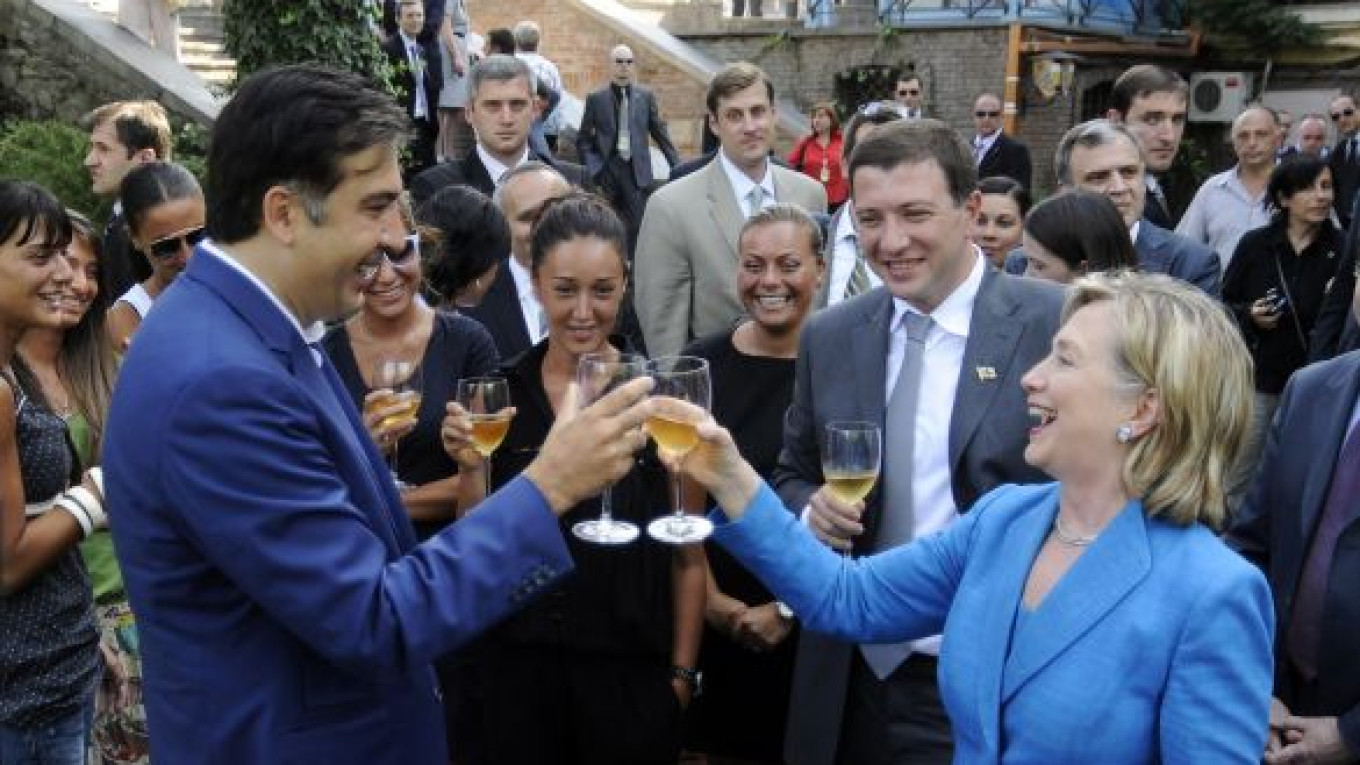TBILISI, Georgia — U.S. Secretary of State Hillary Clinton on Monday condemned Russia for building bases in South Ossetia and Abkhazia and underlined U.S. backing for Tbilisi two years after its war with Moscow.
Making Georgia the last stop in a tour to reassure Russia's neighbors that U.S. President Barack Obama's "reset" with the Kremlin will not harm them, Clinton stressed Washington's anger at Russia's "invasion and occupation" of Georgian territory.
"I came to Georgia with a clear message from President Obama and myself: The United States is steadfast in its commitment to Georgia's sovereignty and territorial integrity," Clinton said at a briefing with Georgian President Mikheil Saakashvili.
But she warned Georgia against provoking Moscow and urged Saakashvili to do more to bolster democracy, suggesting the best way to coax the separatist provinces back into the fold would be through powerful political and economic improvements.
"The United States will do everything we can to assist our partners, inside and outside the Georgian government, as they strive to strengthen democratic institutions and processes," Clinton said. She said the countries "share a deep friendship."
Saakashvili said initial concerns had been dispelled and that Georgia was convinced the reset was being done "the right way … not just changing relations with Russia at the expense of others."
Echoing Washington's argument for embracing Russia more warmly than during the previous U.S. administration, when ties were badly frayed, Saakashvili expressed confidence that the "reset" would ultimately "lead to a more modern, more open Russia."
"That's only good for all of us around it," Saakashvili said.
In a five-day war in August 2008, Russia crushed a Georgian assault on the breakaway Georgian region of South Ossetia, launched after days of clashes between Georgian and rebel forces and years of tension between Moscow and Tbilisi.
Russia strengthened its control over South Ossetia and a second breakaway region, Abkhazia, after the war, and has signed deals with the regions — which it calls independent nations — to build permanent military bases.
"We consider such construction to be in contradiction to Russia's 2008 cease-fire commitments," Clinton said, citing the EU-brokered peace deal that committed Russia and Georgia to withdraw their forces to pre-conflict positions.
But asked how and when the issue might be resolved, Clinton gave no concrete blueprint or timeline, suggesting that all Georgia can do is build itself up as a democratic, economically thriving nation and avoid antagonizing Moscow.
"Whether it's in months or years, it's important for Georgia to continue its modernization reform efforts," Clinton said.
"That sends a very strong message … that this occupation has not undermined the Georgian government and the Georgian people's commitment to their own internal efforts to build the strongest possible state," she said.
Asked about Clinton’s comments, Prime Minister Vladimir Putin warned Georgia against trying to rally U.S. support. “They mustn’t seek solutions outside,” Putin said. “It’s necessary to conduct a dialogue without citing third parties.”
Speaking earlier to a couple of hundred women from rights groups, political movements and other organizations, Clinton said the United States "will stand with you" in pursuit of a stronger Georgian democracy. She did not mention Russia or its invasion until it was raised by a member of her audience.
During a question-and-answer session, one woman asked whether the Obama administration has a "real democracy agenda" for Georgia. She said Georgia suffers from a range of human rights abuses and that these were largely ignored by the administration of former U.S. President George W. Bush.
"The United States always has a democracy agenda," Clinton responded. "Continuing to try to perfect democracy is one of the key challenges for any country — both its government and its citizens."
She applauded recent progress in Georgia, but added that the administration "raises as a friend" its concerns about limits on freedom of expression.
"We take seriously threats to democracy, wherever they occur," Clinton said. "So we're going to continue to support democracy here in Georgia."
Georgia was the final stop on a Clinton tour that began Thursday in Ukraine and also took her to Poland, Azerbaijan and Armenia.
In the Armenian capital of Yerevan earlier Monday, Clinton told human rights activists that Armenian government leaders told her that they are open to liberalizing a recently enacted law restricting radio and television journalists.
Clinton said she was given the assurance in a meeting with Armenian President Serzh Sargsyan.
At a reception for Armenian rights groups representatives at a Yerevan arts center, Clinton said she wanted to encourage them to overcome the difficulties and frustrations of pushing their government to fully respect the right of free expression.
Earlier, Clinton paid her respects for the estimated 1.5 million Armenians who were killed during the final days of the Ottoman empire in what much of the world labels a genocide.
(Reuters, AP)
A Message from The Moscow Times:
Dear readers,
We are facing unprecedented challenges. Russia's Prosecutor General's Office has designated The Moscow Times as an "undesirable" organization, criminalizing our work and putting our staff at risk of prosecution. This follows our earlier unjust labeling as a "foreign agent."
These actions are direct attempts to silence independent journalism in Russia. The authorities claim our work "discredits the decisions of the Russian leadership." We see things differently: we strive to provide accurate, unbiased reporting on Russia.
We, the journalists of The Moscow Times, refuse to be silenced. But to continue our work, we need your help.
Your support, no matter how small, makes a world of difference. If you can, please support us monthly starting from just $2. It's quick to set up, and every contribution makes a significant impact.
By supporting The Moscow Times, you're defending open, independent journalism in the face of repression. Thank you for standing with us.
Remind me later.


